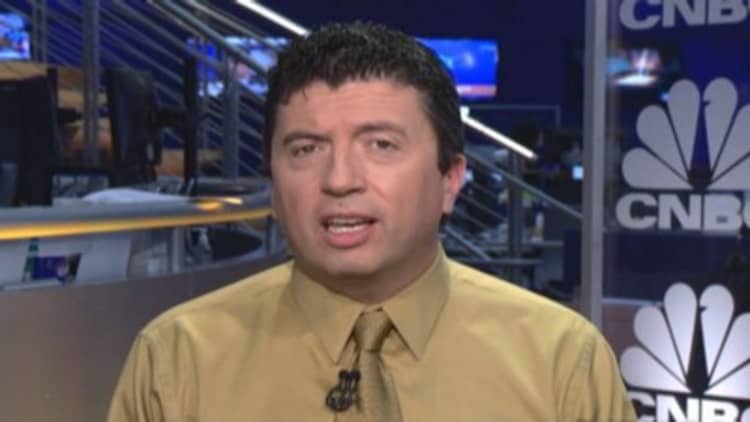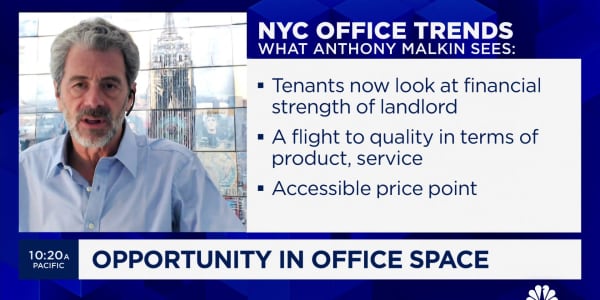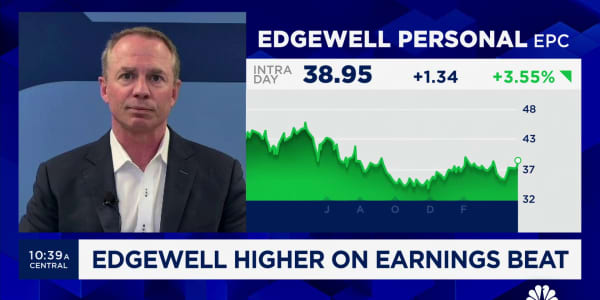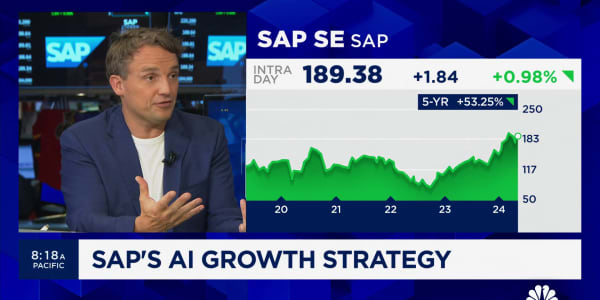
As if the Federal Reserve doesn't have enough to worry about, now it has to contend with the very likely notion that its expectations for growth are considerably too optimistic.
Once again, reality has set up an uncomfortable roadblock in front of expectations, the consequences being that consensus hopes for comparatively robust economic growth in the U.S. and abroad simply outpaced what's happening on the ground.
If nothing else, there's simple math: The Fed's most recent projections, issued in March, show gross domestic product growing at a 2.8 percent to 3 percent clip. But after a -1 percent growth rate in the first quarter, the rest of the year would have to rebound sharply—something north of 4 percent—to reach that target.
Then there are other factors.
Most prominently, even as many economic indicators rise, the housing recovery appears on shaky ground. Recent indicators also show a sharp rise in the U.S. trade deficit. Finally, global growth, particularly in emerging markets, continues to struggle despite expectations that 2014 would be the year that things started to return to normal after five years of mediocre post-financial crisis growth.
Taken together, the picture forced the World Bank to cut its growth estimates, taking down global GDP from an estimated 3.2 percent to 2.8 percent and slashing its U.S. projections from 2.8 percent to 2.1 percent. The news appeared to rattle financial markets at least a bit, with stocks posting modest losses in Wednesday's trading session.
"The thing that is somewhat peculiar is we have a situation where we have significantly improved prospects in the U.S.," said Torsten Slok, chief international economist at Deutsche Bank and a former World Bank official who used to help draft the statement the organization released Wednesday cutting growth estimates. "Obviously, the rest of the world is wrestling with hangover issues from the financial crisis. It looks like more healing is needed."
Read MoreWhy in the world do people keep buying Treasurys?
Generally speaking, Slok adheres to consensus belief that U.S. growth will accelerate through the year, just not at a fast enough pace to match the lofty Fed expectations.
"Two percent is not bad, it's just not three," he said. "What took us all by surprise was we had GDP growth in the first quarter that was so weak and is likely to be a significant drag on the annual number."
In a statement outlining the growth downgrades, Kaushik Basu, the bank's senior vice president and chief economist, advised global policymakers to "prepare for the next crisis" by enacting structural reforms and tightening fiscal policies.
Read MoreWorld Bank: 'Prepare for next crisis now'
In that vein, Slok said he has two primary concerns that could get in the way of a sustained U.S. recovery: Housing weakness—and a policy mistake from the Fed as it seeks to unwind its monthly bond-buying program and, eventually, normalize interest rates. The central bank has kept short-term rates near zero throughout the recovery and is buying $45 billion a month in Treasurys and mortgage-backed securities as part of a quantitative easing program that has sent its balance sheet to nearly $4.4 trillion.
"Should they rattle the tree now or...say we still need more healing?" Slok said. "The risk with the second strategy is they will stretch the rubber band even further so therefore the snapback will be even more quick. I don't have the answers on this, but this is what I am debating with investors all over the world."
He is not alone in these concerns.
Capital Economics, which has a generally sanguine view on the economy, said Wednesday it will be revising down its projections for 3 percent U.S. growth this year and expects the Fed to do the same. In something of a paradox, the firm also believes the Fed will have to lower its unemployment rate projection of 6.1 percent to 6.3 percent, where the rate already sits, and ratchet up its core inflation expectations, currently anchored at a benign 1.4 percent to 1.6 percent.
Read MoreAmericans feeling better about economy
The result, senior U.S. economist Paul Dales said, is that the Fed may have to raise rates more quickly than it currently projects, despite the 2014 disappointment.
Capital's Julian Jessop said the current level of complacency about Fed policy and its ability to manage the economy and markets could prove dangerous.
"Admittedly, there are no obvious triggers on the horizon for a major correction," Jessop said in a note. "However, the omnipotence of policymakers may be tested and found wanting by some new economic or financial shock, as yet unknown."
It is, of course, always the unknown that poses the biggest danger to markets, and a Fed slip-up based on its misunderstanding of what's happening in the various economic crosscurrents is the greatest potential shock of all in the current climate.
"The potential for significantly higher U.S. yields is likely to cause a re-run of last year's emerging market turmoil as the firmer borrowing costs are rudely blown offshore," Andrew Wilkinson, chief market analyst at Interactive Brokers, said in a note. "As U.S. markets recoil from record highs, we're pretty sure we can hear investors complain that this isn't the way the recovery was supposed to work."






